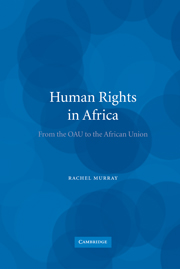Book contents
- Frontmatter
- Contents
- Acknowledgements
- List of abbreviations
- 1 Historical overview of human rights in the OAU/AU
- 2 The relationship between the OAU/AU and the African Commission on Human and Peoples' Rights
- 3 The link between human rights and democracy
- 4 The relationship between conflict and human rights
- 5 Women and the OAU/AU
- 6 Children's rights in the OAU/AU
- 7 Refugees and human rights
- 8 Development, NEPAD and human rights
- 9 Conclusion
- Appendix I Charter of the Organization of African Unity
- Appendix II Constitutive Act of the African Union
- Appendix III African Charter on Human and Peoples' Rights
- Bibliography
- Index
1 - Historical overview of human rights in the OAU/AU
Published online by Cambridge University Press: 27 July 2009
- Frontmatter
- Contents
- Acknowledgements
- List of abbreviations
- 1 Historical overview of human rights in the OAU/AU
- 2 The relationship between the OAU/AU and the African Commission on Human and Peoples' Rights
- 3 The link between human rights and democracy
- 4 The relationship between conflict and human rights
- 5 Women and the OAU/AU
- 6 Children's rights in the OAU/AU
- 7 Refugees and human rights
- 8 Development, NEPAD and human rights
- 9 Conclusion
- Appendix I Charter of the Organization of African Unity
- Appendix II Constitutive Act of the African Union
- Appendix III African Charter on Human and Peoples' Rights
- Bibliography
- Index
Summary
Introduction
Human rights instruments and the organs that they created were for many years on the periphery of the political institutions under which they fell. This is despite the fact that the manner in which they are formulated and structured requires them to rely on these political institutions for their funding, nominations and appointments to their own organs and in some cases enforcement of their decisions.
Further, human rights as a discipline has evolved somewhat separately from international law, and international politics has been separated from international law. Thus, human rights have tended to have been dealt with by separate bodies created under the distinct human rights instruments and it is only recently that there has been an increased convergence of human rights into the mainstream of international organisations' thinking. Just as there has been a closer relationship between the European Convention on Human Rights (ECHR) and the European Union (EU), so the African political organisation, the Organization of African Unity (OAU), which is now being transformed into the African Union (AU), illustrates this closer attention to human rights as falling within its remit. Whilst a separate instrument was adopted under the auspices of the OAU in 1981 specifically to deal with human rights (the African Charter on Human and Peoples' Rights (ACHPR)), it remained largely on the periphery of the OAU's attention until recently. Yet in later years the OAU organs developed an approach to human rights.
- Type
- Chapter
- Information
- Human Rights in AfricaFrom the OAU to the African Union, pp. 1 - 48Publisher: Cambridge University PressPrint publication year: 2004
- 2
- Cited by



